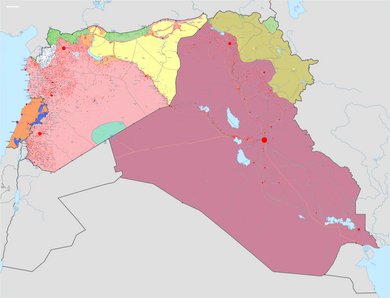
The Timeline of the War in Iraq covers the War in Iraq, a war which erupted that lasted in Iraq from 2014 to 2017, during the first year of armed conflict.

The Timeline of the War in Iraq covers the War in Iraq, a war which erupted that lasted in Iraq from 2014 to 2017, during the first year of armed conflict.




Beginning in December 2012, Sunnis in Iraq protested against the Maliki government. On 28 December 2013, a Sunni MP named Ahmed al-Alwani was arrested in a raid on his home in Ramadi. Alwani was a prominent supporter of the anti-government protests. This incident led to violence in Al Anbar Governorate between the Iraqi Army and a loose alliance of tribal militias and other groups fighting alongside the Islamic State in Iraq and the Levant (ISIL).
The Northern Iraq offensive began on 4 June 2014, when the Islamic State of Iraq and the Levant (ISIL) and allied forces began a major offensive in northern Iraq against Iraqi government forces, following earlier clashes that had begun in December 2013.
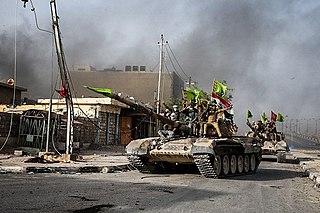
The War in Iraq was an armed conflict which began in December 2013 and ended in December 2017. In 2013, the Iraqi insurgency escalated into a full-scale war with the conquest of Ramadi, Fallujah, Mosul, Tikrit and in the major areas of northern Iraq by the Islamic State of Iraq and the Levant. At its height, ISIL held 56,000 square kilometers of Iraqi territory, containing 4.5 million citizens. This resulted in the forced resignation of Iraqi Prime Minister Nouri al-Maliki, as well as a massive airstrike campaign by the United States and at least a dozen other countries, participation of American and Canadian troops in ground combat operations, a $3.5 billion U.S.-led program to rearm the Iraqi Security Forces, a U.S.-led training program that provided training to nearly 200,000 Iraqi soldiers and police, the participation of Iranian troops including armored and air elements, and military and logistical aid provided to Iraq by Russia.

In response to rapid territorial gains made by the Islamic State of Iraq and the Levant (ISIL) during the first half of 2014, and its universally condemned executions, reported human rights abuses and the fear of further spillovers of the Syrian Civil War, many states began to intervene against it in both the Syrian Civil War and the Iraqi Civil War. Later, there were also minor interventions by some states against ISIL-affiliated groups in Nigeria and Libya.

The departure of US troops from Iraq in 2011 ended the period of occupation that had begun with the U.S.-led invasion in March 2003. The time since U.S. withdrawal has been marked by a renewed Iraqi insurgency and by a spillover of the Syrian civil war into Iraq. By 2013, the insurgency escalated into a renewed civil war, the central government of Iraq being opposed by various factions, primarily radical Sunni forces.
The following lists events that happened during 2014 in Iraq.
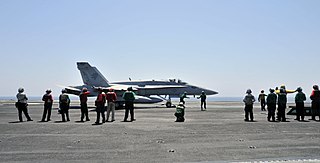
An American-led intervention in Iraq started on 15 June 2014, when President Barack Obama ordered United States forces to be dispatched to the region, in response to offensives in Iraq conducted by the Islamic State of Iraq and the Levant (ISIL). At the invitation of the Iraqi government, American troops went to assess Iraqi forces and the threat posed by ISIL.
This is a timeline of events during the Iraqi Civil War in 2015.
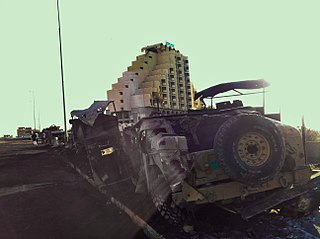
The Fall of Mosul occurred between 4–10 June 2014, when Islamic State of Iraq and the Levant (ISIL) insurgents, initially led by Abu Abdulrahman al-Bilawi, defeated the Iraqi Army, led by Lieutenant General Mahdi Al-Gharrawi.
In early 2014, the jihadist group Islamic State of Iraq and the Levant captured extensive territory in Western Iraq in the Anbar campaign, while counter-offensives against it were mounted in Syria. Raqqa in Syria became its headquarters. The Wall Street Journal estimated that eight million people lived under its control in the two countries.
This article contains a timeline of events from January 2015 to December 2015 related to the Islamic State of Iraq and the Levant (ISIL/ISIS). This article contains information about events committed by or on behalf of the Islamic State, as well as events performed by groups who oppose them.
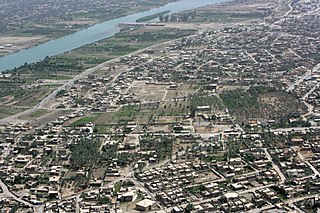
The Battle of Ramadi (2015–2016) was a battle launched by the forces of Iraq to successfully recapture the city of Ramadi from the Islamic State of Iraq and the Levant (ISIL), which had taken the city earlier in 2015 in a previous battle. Air power was a major component of the battle, with the United States and other nations conducting over 850 airstrikes in the Ramadi area from July 2015 to late February 2016, and the US crediting airstrikes with 80% of the reason why the city was recaptured. By February 2016, Iraqi forces successfully recaptured the city after two and a half months of fighting. It was predicted that it would take several months to clear the city of the bombs ISIL left behind, with at least 9 months needed to clear the city's Tamim District. At the time, Ramadi had suffered more damage than any other city or town in Iraq.

The Mosul offensive (2016), codenamed Operation Conquest or Operation Fatah, was an offensive against the positions of the Islamic State of Iraq and the Levant (ISIL) in Mosul and the surrounding region. Mosul fell to ISIL between 4 and 10 June 2014.

The Anbar campaign (2015–2016) was a military campaign launched by the Iraqi Armed Forces and their allies aimed at recapturing areas of the Anbar Governorate held by the Islamic State of Iraq and the Levant (ISIL), including the city of Ramadi, which ISIL seized earlier in 2015. The United States and other nations aided Iraq with airstrikes.
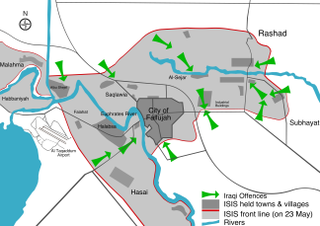
The Siege of Fallujah (2016) was an offensive that the Iraqi government launched against ISIL in Al-Karmah and in the city of Fallujah, with the aim of enforcing a siege of Fallujah. During the operation, local Sunni residents revolted against ISIL for a period of 3 days, in February 2016. On 22 May, after completing preparations around the city, the Iraqi Army and supporting Shi'ite militias launched the Third Battle of Fallujah.
This is a timeline of events during the Iraqi Civil War in 2016.

The Third Battle of Fallujah, code-named Operation Breaking Terrorism by the Iraqi government, was a military operation against ISIL launched to capture the city of Fallujah and its suburbs, located about 69 kilometres (43 mi) west of the Iraqi capital Baghdad. The operation began on 22 May 2016, three months after the Iraqi forces had started the total siege of Fallujah. On 26 June, Iraqi forces recaptured the city of Fallujah, before recapturing the remaining pocket of ISIL resistance in Fallujah's western outskirts two days later.
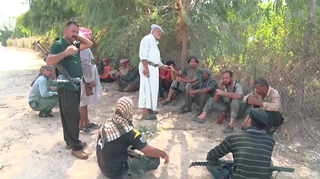
The Iraqi Insurgency (2017–present) is an ongoing low-level insurgency that began in late 2017 after the Islamic State of Iraq and the Levant (ISIL) lost territorial control in the War in Iraq of 2014 to 2017. Several rebel groups, including ISIL, White Flags and the Iraqi Baath Party fight the Iraqi military and allied paramilitary forces.
|1= (help)The Times reports three of the deceased Britons originally hailed from East London's Tower Hamlets, which is populated by a vibrant Muslim community. They are thought to come from the borough’s Bangladeshi district. The fourth British casualty, Ibrahim Kamara, was a 19-year-old student from Brighton.